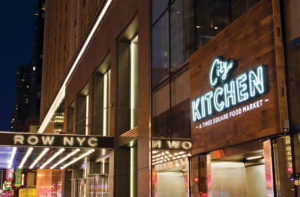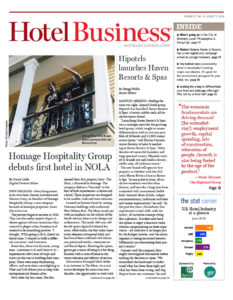NATIONAL REPORT—Today’s travelers are seeking more authentic experiences—especially when it comes to their culinary pursuits.
In the past, travelers would stop at fast food restaurants because they knew that the burger they would get on the road would be the same one they got at home. But now, they want something different: When they go to New Orleans, they want Cajun food, or when they visit Nashville, they want barbecue. Whatever guests choose—and the options these days seem endless—they want authenticity, they want fresh and they want variety.
So it’s no surprise, then, that some hoteliers have jumped on one of the latest food trends—food halls. It’s an experience guests are craving.
Food halls are like an upgraded food court, but instead of housing more traditional national food brands, they are made up of fast-casual venues featuring authentic international cuisines or gourmet twists on popular items with fresh, locally sourced ingredients. Food halls have popped up all around the country—from shopping malls to transit hubs to college campuses.
Heidi Avedisian, the curator and interior designer for City Kitchen at Row NYC in New York’s Times Square, thinks that food halls are a natural fit for a hotel—and a trend that will last. “We launched City Kitchen in 2015 and since then, food halls have popped up all over New York City, so yes, I think that is positive reinforcement that food halls are here to stay,” she said. “A food hall offers diversity, ease and fun—elements that we feel are important to guests and locals. A guest can experience a multitude of destination-specific options in one place versus hitting the pavement of an entire city. For locals, a food hall becomes a one-stop food haven.”
The leased venues in the City Kitchen are a variety of offerings from some of New York’s most popular spaces: Azuki (sushi); Ilili Box (Mediterranean); Dough (donuts); Gabriela’s Taqueria (fresh Mexican); Kuro-Obi (ramen); Luke’s Lobster (seafood); and Whitmans (burgers). “We first targeted the types of food that were missing from the neighborhood and felt people would be excited to have as an option. From there, we sought out the best of the best. Every item had to be consistently crave-worthy,” she said.

City Kitchen food hall is the main food and beverage provider for Row NYC in New York City’s Times Square.
The food hall offerings are also popular among New York locals. “Having local support further validates for our guests that City Kitchen is the real deal. We created City Kitchen equally for people visiting New York and for those who live and breathe it every day,” Avedisian noted.
Food halls have found their way into hospitality projects currently under development. One will be an anchor of a new adaptive-reuse project, which will transform a former Coca-Cola bottling facility in Indianapolis into an entertainment hub featuring a boutique hotel (see page 3). The Garage at Bottleworks, scheduled to open in the spring of 2020, is a 30,000-sq.-ft., local-focused food and market hall. More than 25 food and beverage vendors are expected to occupy the space.
The Urban Pantry food hall is on the menu for Universal’s Aventura Hotel, which is set to open this month. “Universal’s Aventura Hotel is designed for the savvy traveler, so it required a modern dining concept,” said Stephen Cummings, managing director of the hotel, which is operated by Loews Hotels at Universal Orlando. “From the food to the bright atmosphere and sleek decor, Urban Pantry fits perfectly into the contemporary and stylish vibe of the hotel.”
He continued, “When guests come, they are here to experience the Universal Orlando Resort destination, and staying at one of our on-site hotels offers not only convenience, but also exclusive benefits. For this reason, we anticipate a captive and engaged audience of guests in Urban Pantry who will appreciate a new dining concept.”
Urban Pantry will include four separate stations, each one designed with the “modern foodie” in mind. “Each station is casual, interactive and contemporary, with fresh ingredients and lots of options for every palate, including select organic and all-natural ingredients,” said Cummings.
The Roast Station will feature entrées like cuts of lamb and prime rib, plus chicken, salmon and paella. “Guests can then pair these with sides like quinoa, couscous, spinach and seasonal veggies,” he said.
At the Pizza Station, chefs will create pizzas topped with gourmet ingredients like prosciutto and smoked salmon. “These are baked in high-temperature stone ovens with seating design that lets guests watch their pie in the making,” said Cummings. “For dessert, indulge in a gelato sandwich, a pressed sweet bread filled with hazelnut chocolate and gelato.”
The Wok Station will offer guests the ability to customize their dishes. “They can create a hearty, healthy bowl of fresh ingredients, by choosing stir fry or ramen-style, then picking a protein like steak, chicken, shrimp or tofu and top it off with a choice of vegetables,” he said. “This station will also offer a selection of sushi and appetizers like tuna poke, crab spring rolls and dumplings.”
The Burger Station will include a choice of grass-fed beef, Black Angus beef, turkey burger or vegetarian burger garnished with an assortment of cheeses and toppings.
Cummings believes that the food-hall concept will be a success not only at this hotel, but a number of other properties, as well. “As a former executive chef, I believe food halls speak to our desire for a high-quality, less-pretentious dining experience that satisfies a variety of appetites in a unique, thoughtful way,” he said. “Experiencing international street food in a hotel setting is a trend that I see continuing for the foreseeable future.” HB


